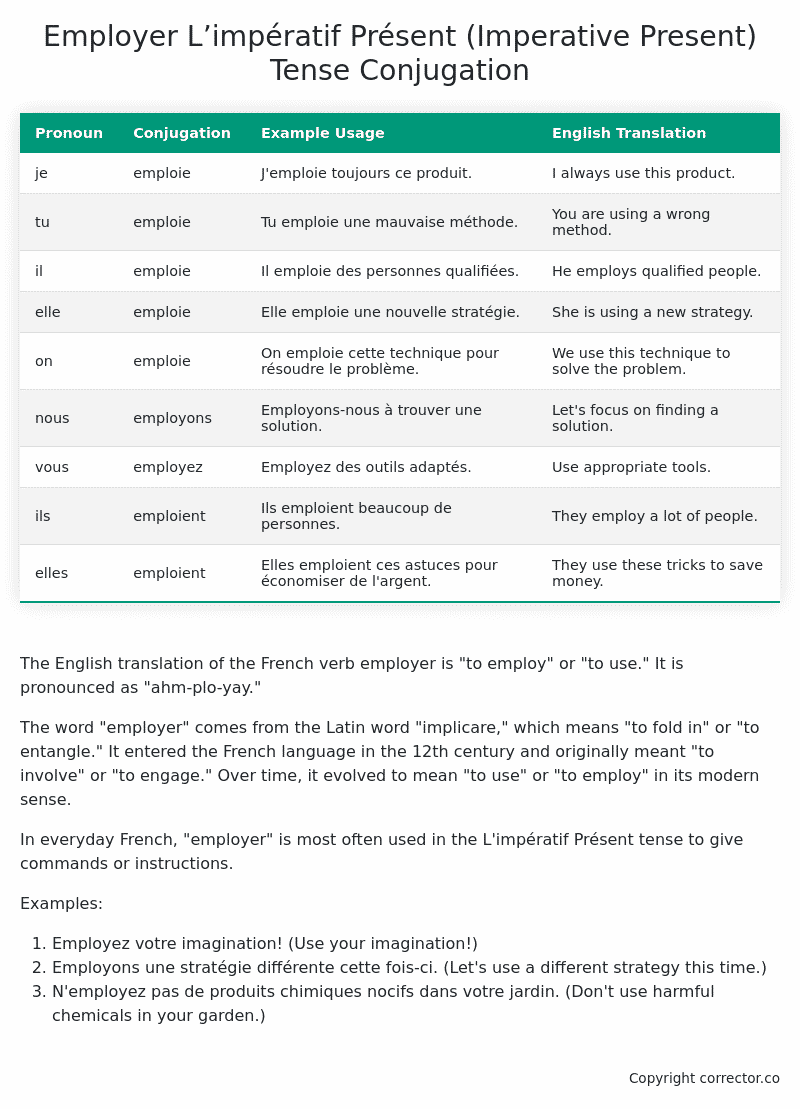L’impératif Présent (Imperative Present) Tense Conjugation of the French Verb employer
Introduction to the verb employer
The English translation of the French verb employer is “to employ” or “to use.” It is pronounced as “ahm-plo-yay.”
The word “employer” comes from the Latin word “implicare,” which means “to fold in” or “to entangle.” It entered the French language in the 12th century and originally meant “to involve” or “to engage.” Over time, it evolved to mean “to use” or “to employ” in its modern sense.
In everyday French, “employer” is most often used in the L’impératif Présent tense to give commands or instructions.
Examples:
- Employez votre imagination! (Use your imagination!)
- Employons une stratégie différente cette fois-ci. (Let’s use a different strategy this time.)
- N’employez pas de produits chimiques nocifs dans votre jardin. (Don’t use harmful chemicals in your garden.)
Table of the L’impératif Présent (Imperative Present) Tense Conjugation of employer
| Pronoun | Conjugation | Example Usage | English Translation |
|---|---|---|---|
| je | emploie | J’emploie toujours ce produit. | I always use this product. |
| tu | emploie | Tu emploie une mauvaise méthode. | You are using a wrong method. |
| il | emploie | Il emploie des personnes qualifiées. | He employs qualified people. |
| elle | emploie | Elle emploie une nouvelle stratégie. | She is using a new strategy. |
| on | emploie | On emploie cette technique pour résoudre le problème. | We use this technique to solve the problem. |
| nous | employons | Employons-nous à trouver une solution. | Let’s focus on finding a solution. |
| vous | employez | Employez des outils adaptés. | Use appropriate tools. |
| ils | emploient | Ils emploient beaucoup de personnes. | They employ a lot of people. |
| elles | emploient | Elles emploient ces astuces pour économiser de l’argent. | They use these tricks to save money. |
Other Conjugations for Employer.
Le Present (Present Tense) Conjugation of the French Verb employer
Imparfait (Imperfect) Tense Conjugation of the French Verb employer
Passé Simple (Simple Past) Tense Conjugation of the French Verb employer
Passé Composé (Present Perfect) Tense Conjugation of the French Verb employer
Futur Simple (Simple Future) Tense Conjugation of the French Verb employer
Futur Proche (Near Future) Tense Conjugation of the French Verb employer
Plus-que-parfait (Pluperfect) Tense Conjugation of the French Verb employer
Passé Antérieur (Past Anterior) Tense Conjugation of the French Verb employer
Futur Antérieur (Future Anterior) Tense Conjugation of the French Verb employer
Subjonctif Présent (Subjunctive Present) Tense Conjugation of the French Verb employer
Subjonctif Passé (Subjunctive Past) Tense Conjugation of the French Verb employer
Subjonctif Imparfait (Subjunctive Imperfect) Tense Conjugation of the French Verb employer
Subjonctif Plus-que-parfait (Subjunctive Pluperfect) Tense Conjugation of the French Verb employer
Conditionnel Présent (Conditional Present) Tense Conjugation of the French Verb employer
Conditionnel Passé (Conditional Past) Tense Conjugation of the French Verb employer
L’impératif Présent (Imperative Present) Tense Conjugation of the French Verb employer (this article)
L’infinitif Présent (Infinitive Present) Tense Conjugation of the French Verb employer
Struggling with French verbs or the language in general? Why not use our free French Grammar Checker – no registration required!
Get a FREE Download Study Sheet of this Conjugation 🔥
Simply right click the image below, click “save image” and get your free reference for the employer L’impératif Présent tense conjugation!

Employer – About the French L’impératif Présent (Imperative Present) Tense
Usage
Giving commands
Making requests
Offering advice
Expressing desires
Conjugation Formation
Interactions with other tenses
Want More?
I hope you enjoyed this article on the verb employer. Still in a learning mood? Check out another TOTALLY random French verb conjugation!


